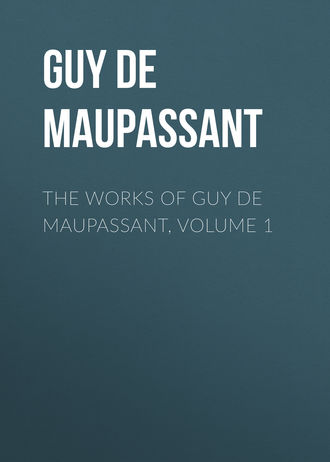
Ги де Мопассан
The Works of Guy de Maupassant, Volume 1
WHAT WAS REALLY THE MATTERWITH ANDREW
The lawyer's house looked on to the Square. Behind it, there was a nice, well-kept garden, with a back entrance into a narrow street which was almost always deserted, and from which it was separated by a wall.
At the bottom of that garden Maitre14 Moreau's wife had promised, for the first time, to meet Captain Sommerive, who had been making love to her for a long time.
Her husband had gone to Paris for a week, so she was quite free for the time being. The Captain had begged so hard, and had used such loving words, she was certain that he loved her so ardently, and she felt so isolated, so misunderstood, so neglected amidst all the law business which seemed to be her husband's sole pleasure, that she had given away her heart without even asking herself whether it would give her anything else at some future time.
Then, after some months of platonic love, of pressing of hands, of kisses rapidly stolen behind a door, the Captain had declared that he would ask permission to exchange, and leave the town immediately, if she would not grant him a meeting, a real meeting, during her husband's absence; and so at length she yielded to his importunity.
Just then she was waiting, close against the wall, with a beating heart, trembling at the slightest sound, and when at length she heard somebody climbing up the wall, she very nearly ran away.
Suppose it were not he, but a thief? But no; someone called out softly, "Matilda!" and when she replied, "Etienne!" a man jumped on to the path with a crash.
It was he, – and what a kiss!
For a long time they remained in each other's arms, with united lips. But suddenly a fine rain began to fall, and the drops from the leaves fell on to her neck and made her start. Whereupon he said:
"Matilda, my adored one, my darling, my angel, let us go indoors. It is twelve o'clock, we can have nothing to fear; please let us go to your room."
"No, dearest; I am too frightened."
But he held her in his arms, and whispered in her ear:
"Your servants sleep on the third floor, looking on to the Square, and your room, on the first, looks on to the garden, so nobody can hear us. I love you so that I wish to love you entirely, from head to foot." And he embraced her vehemently.
She resisted still, frightened and even ashamed. But he put his arms round her, lifted her up, and carried her off under the rain, which was by this time descending in torrents.
The door was open; they groped their way upstairs; and when they were in the room he bolted the door while she lit a match.
Then she fell, half fainting, into a chair, while he knelt down beside her.
At last, she said, panting:
"No! no! Etienne, please let me remain a virtuous woman; I should be too angry with you afterwards; and after all, it is so horrid, so common. Cannot we love each other with a spiritual love only?.. Oh! Etienne!"
But he was inexorable, and then she tried to get up and escape from his attacks.
In her fright she ran to the bed in order to hide herself behind the curtains; but it was a dangerous place of refuge, and he followed her. But in haste he took off his sword too quickly, and it fell on the floor with a crash.
And then – a prolonged, shrill child's cry came from the next room, the door of which had remained open.
"You have awakened the child," she whispered, "and perhaps he will not go to sleep again."
He was only fifteen months old, and slept in a room opening out of hers, so that she might be able to hear him.
The Captain exclaimed, ardently:
"What does it matter, Matilda? How I love you; you must come to me, Matilda."
But she struggled, and resisted in her fright.
"No! no! Just listen how he is crying; he will wake up the nurse, and what should we do if she were to come? We should be lost. Just listen to me, Etienne. When he screams at night his father always takes him into our bed, and he is quiet immediately; it is the only means of keeping him still. Do let me take him…"
The child roared, uttered shrill screams, which pierced the thickest walls, so as to be heard by passers-by in the streets.
In his consternation, the Captain got up, and Matilda jumped out and took the child into her bed, when he was quiet at once.
Etienne sat astride on a chair, and made a cigarette, and in about five minutes Andrew went to sleep again.
"I will take him back," his mother said; and she took him back very carefully to his bed.
When she returned, the Captain was waiting for her with open arms, and put his arms round her in a transport of love, while she, embracing him more closely, said, stammering:
"Oh! Etienne, my darling, if you only knew how I love you; how…"
Andrew began to cry again, and he, in a rage, exclaimed:
"Confound it all, won't the little brute be quiet?"
No, the little brute would not be quiet, but howled all the louder, on the contrary.
She thought she heard a noise downstairs; no doubt the nurse was coming, so she jumped up, and took the child into bed, and he grew quiet directly.
Three times she put him back, and three times she had to fetch him again, and an hour before daybreak the Captain had to go, swearing like the proverbial trooper; and, to calm his impatience, Matilda promised to receive him again the next night.
Of course he came, more impatient and ardent than ever, excited by the delay.
He took care to put his sword carefully into a corner; he took off his boots like a thief, and spoke so low that Matilda could hardly hear him. At last, he was just going to be really happy when the floor, or some piece of furniture, or perhaps the bed itself, creaked; it sounded as if something had broken; and in a moment a cry, feeble at first, but which grew louder every moment, made itself heard. Andrew was awake again.
He yapped like a fox, and there was not the slightest doubt that if he went on like that the whole house would awake; so his mother, not knowing what to do, got up and brought him. The Captain was more furious than ever, but did not move, and very carefully he put out his hand, took a small piece of the child's skin between his two fingers, no matter where it was, the thighs or elsewhere, and pinched it. The little one struggled and screamed in a deafening manner, but his tormentor pinched everywhere furiously and more vigorously. He took a morsel of flesh and twisted and turned it, and then let go in order to take hold of another piece, and then another and another.
The child screamed like a chicken that is having its throat cut, or a dog that is being mercilessly beaten. His mother caressed him, kissed him, and tried to stifle his cries by her tenderness; but Andrew grew purple, as if he were going into convulsions, and kicked and struggled with his little arms and legs in an alarming manner.
The Captain said, softly:
"Try and take him back to his cradle; perhaps he will be quiet."
And Matilda went into the other room with the child in her arms.
As soon as he was out of his mother's bed he cried less loudly, and when he was in his own he was quiet, with exception of a few broken sobs.
The rest of the night was tranquil.
The next night he came again. As he happened to speak rather loudly, Andrew awoke again and began to scream. His mother went and fetched him immediately, but the Captain pinched so hard and long that the child was nearly suffocated by its cries, and its eyes turned in its head and it foamed at the mouth; as soon as it was back in its cradle it was quiet, and in four days Andrew did not cry any more to come into his mother's bed.
On Saturday evening the lawyer returned, and took his place again at the domestic hearth and in the conjugal chamber.
As he was tired with his journey he went to bed early; but he had not long lain down when he said to his wife:
"Why, how is it that Andrew is not crying? Just go and fetch him, Matilda; I like to feel that he is between us."
She got up and brought the child, but as soon as he saw that he was in that bed, in which he had been so fond of sleeping a few days previously, he wriggled and screamed so violently in his fright that she had to take him back to his cradle.
M. Moreau could not get over his surprise. "What a very funny thing! What is the matter with him this evening? I suppose he is sleepy?"
"He has been like that all the time that you were away; I have never been able to have him in bed with me once."
In the morning the child woke up and began to laugh and play with his toys.
The lawyer, who was an affectionate man, got up, kissed his offspring, and took him into his arms to carry him to their bed. Andrew laughed, with that vacant laugh of little creatures whose ideas are still vague. He suddenly saw the bed and his mother in it, and his happy little face puckered up, till suddenly he began to scream furiously, and struggled as if he were going to be put to the torture.
In his astonishment his father said:
"There must be something the matter with the child," and mechanically he lifted up his little nightshirt.
He uttered a prolonged "O – o – h!" of astonishment. The child's calves, thighs, and buttocks were covered with blue spots as big as halfpennies.
"Just look, Matilda!" the father exclaimed; "this is horrible!" And the mother rushed forward in a fright. It was horrible; no doubt the beginning of some sort of leprosy, of one of those strange affections of the skin which doctors are often at a loss to account for.
The parents looked at one another in consternation.
"We must send for the doctor," the father said.
But Matilda, pale as death, was looking at her child, who was spotted like a leopard. Then suddenly uttering a violent cry, as if she had seen something that filled her with horror, she exclaimed:
"Oh! the wretch!"
In his astonishment M. Moreau asked: "What are you talking about? What wretch?"
She got red up to the roots of her hair, and stammered:
"Oh, nothing! but I think I can guess – it must be – we ought to send for the doctor … it must be that wretch of a nurse who has been pinching the poor child to make him keep quiet when he cries."
In his rage the lawyer sent for the nurse, and very nearly beat her. She denied it most impudently, but was instantly dismissed, and the Municipality having been informed of her conduct, she will find it a hard matter to get another situation.
MY LANDLADY
At that time (George Kervelen said) I was living in furnished lodgings in the Rue des Saints-Pères.
When my father had made up his mind that I should go to Paris to continue my law studies, there had been a long discussion about settling everything. My allowance had been fixed at first at two thousand five hundred francs, but my poor mother was so anxious, that she said to my father that if I spent my money badly I might not take enough to eat, and then my health would suffer, and so it was settled that a comfortable boarding-house should be found for me, and that the amount should be paid to the proprietor himself, or herself, every month.
Some of our neighbors told us of a certain Mme. Kergaran, a native of Brittany, who took in boarders, and so my father arranged matters by letter with this respectable person, at whose house I and my luggage arrived one evening.
Mme. Kergaran was a woman of about forty. She was very stout, had a voice like a drill-sergeant, and decided everything in a very abrupt manner. Her house was narrow, with only one window opening on to the street on each story, which rather gave it the appearance of a ladder of windows, or better, perhaps, of a slice of a house sandwiched in between two others.
The landlady lived on the first floor with her servant, the kitchen and dining-room were on the second, and four boarders from Brittany lived on the third and fourth, and I had two rooms on the fifth.
A little dark corkscrew staircase led up to these attics. All day long Mme. Kergaran was up and down these stairs like a captain on board ship. Ten times a day she would go into each room, noisily superintending everything, seeing that the beds were properly made, the clothes well brushed, if the attendance were all that it should be; in a word, she looked after her boarders like a mother, and better than a mother.
I soon made the acquaintance of my four fellow-countrymen. Two were medical and two were law students, but all impartially endured the landlady's despotic yoke. They were as frightened of her as a boy robbing an orchard would be of a rural policeman.
I, however, immediately felt that I wished to be independent; it is my nature to rebel. I declared at once that I meant to come in at whatever time I liked, for Mme. Kergaran had fixed twelve o'clock at night as the limit. On hearing this she looked at me for a few moments, and then said:
"It is quite impossible; I cannot have Annette awakened at any hour of the night. You can have nothing to do out-of-doors at such a time."
I replied firmly that, according to the law, she was obliged to open the door for me at any time.
"If you refuse," I said, "I shall get a policeman to witness the fact, and go and get a bed at some hotel, at your expense, in which I shall be fully justified. You will, therefore, be obliged either to open the door for me or to get rid of me. Do which you please."
I laughed in her face as I told her my conditions. She could not speak for a moment for surprise, then she tried to negotiate, but I was firm, and she was obliged to yield; and so it was agreed that I should have a latchkey, on my solemn undertaking that no one else should know it.
My energy made such a wholesome impression on her that from that time she treated me with marked favor; she was most attentive, and even showed me a sort of rough tenderness which was not at all unpleasing. Sometimes when I was in a jovial mood I would kiss her by surprise, if only for the sake of getting the box on the ears which she gave me immediately afterwards. When I managed to duck my head quickly enough, her hand would pass over me as swiftly as a ball, and I would run away laughing, while she would call after me:
"Oh! you wretch, I will pay you out for that."
However, we soon became real friends.
It was not long before I made the acquaintance of a girl who was employed in a shop, and whom I constantly met. You know what such sort of love affairs are in Paris. One fine day, going to a lecture, you meet a work-girl going to work arm-in-arm with a friend. You look at her and feel that pleasant little shock which the eye of some women gives you. The next day at the same time, going through the same street, you meet her again, and the next, and the succeeding days. At last you speak, and the love affair follows its course just like an illness.
Well, by the end of three weeks I was on that footing with Emma which precedes a fall. The fall would indeed have taken place much sooner had I known where to bring it about. The girl lived at home, and utterly refused to go to an hotel. I did not know how to manage, but at last I took the desperate resolve to take her to my room some night at about eleven o'clock, under the pretense of giving her a cup of tea. Mme. Kergaran always went to bed at ten, so that we could get in by means of my latchkey without exciting any attention, and go down again in an hour or two in the same way.
After a good deal of entreaty on my part, Emma accepted my invitation.
I did not spend a very pleasant day, for I was by no means easy in my mind. I was afraid of complications, of a catastrophe, of some scandal. At night I went into a café, and drank two cups of coffee, and three or four glasses of cognac, to give me courage, and when I heard the clock strike half-past ten, I went slowly to the place of meeting, where she was already waiting for me. She took my arm in a coaxing manner, and we set off slowly towards my lodgings. The nearer we got to the door the more nervous I got, and I thought to myself – "If only Mme. Kergaran is in bed already."
I said to Emma two or three times:
"Above all things, don't make any noise on the stairs," to which she replied, laughing:
"Are you afraid of being heard?"
"No," I said, "but I am afraid of waking the man who sleeps in the room next to me, who is not at all well."
When I got near the house I felt as frightened as a man does who is going to the dentist's. All the windows were dark, so no doubt everybody was asleep, and I breathed again. I opened the door as carefully as a thief, let my fair companion in, shut it behind me, and went upstairs on tiptoe, holding my breath, and striking wax-matches lest the girl should make a false step.
As we passed the landlady's door I felt my heart beating very quickly, but we reached the second floor, then the third, and at last the fifth, and got into my room. Victory!
However, I only dared to speak in a whisper, and took off my boots so as not to make any noise. The tea, which I made over a spirit-lamp, was soon drunk, and then I became pressing, till little by little, as if in play, I, one by one, took off my companion's clothes, who yielded while resisting, blushing, confused.
She had absolutely nothing more on except a short white petticoat when my door suddenly opened, and Mme. Kergaran appeared with a candle in her hand, in exactly the same costume as Emma.
I jumped away from her and remained standing up, looking at the two women, who were looking at each other. What was going to happen?
My landlady said, in a lofty tone of voice which I had never heard from her before:
"Monsieur Kervelen, I will not have prostitutes in my house."
"But, Madame Kergaran," I stammered, "the young lady is a friend of mine. She just came in to have a cup of tea."
"People don't take tea in their chemise. You will please make this person go directly."
Emma, in a natural state of consternation, began to cry, and hid her face in her petticoat, and I lost my head, not knowing what to do or say. My landlady added, with irresistible authority:
"Help her to dress, and take her out at once."
It was certainly the only thing I could do, so I picked up her dress from the floor, put it over her head, and began to fasten it as best I could. She helped me, crying all the time, hurrying and making all sorts of mistakes and unable to find either buttonholes or laces, while Mme. Kergaran stood by motionless, with the candle in her hand, looking at us with the severity of a judge.
As soon as Emma was dressed, without even stopping to button her boots, she rushed past the landlady and ran down stairs. I followed her in my slippers and half undressed, and kept repeating: "Mademoiselle! Mademoiselle!"
I felt that I ought to say something to her, but I could not find anything. I overtook her just by the street-door, and tried to take her into my arms, but she pushed me violently away, saying in a low, nervous voice:
"Leave me alone, leave me alone!" and so ran out into the street, closing the door behind her.
When I went upstairs again I found that Mme. Kergaran was waiting on the first landing, and I went up slowly, expecting, and ready for, anything.
Her door was open, and she called me in, saying in a severe voice:
"I want to speak to you, M. Kervelen."
I went in, with my head bent. She put her candle on the mantelpiece, and then, folding her arms over her expansive bosom, which a fine white dressing-jacket hardly covered, she said:
"So, Monsieur Kervelen, you think my house is a house of ill-fame?"
I was not at all proud. I murmured:
"Oh, dear, no! But, Mme. Kergaran, you must not be angry; you know what young men are."
"I know," was her answer, "that I will not have such creatures here, so you will understand that. I expect to have my house respected, and I will not have it lose its reputation, you understand me? I know…"
She went on thus for at least twenty minutes, overwhelming me with the good name of her house, with reasons for her indignation, and loading me with severe reproofs. I went to bed crestfallen, and resolved never again to try such an experiment, so long, at least, as I continued to be a lodger of Mme. Kergaran.






